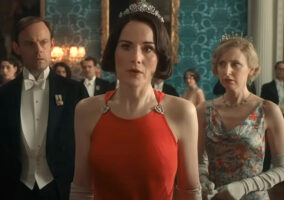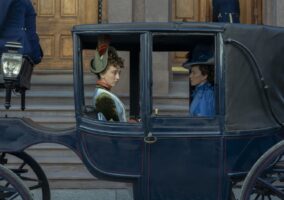The trick to watching any episode of Downton Abbey – if one really needs a trick to get through it at all – is to  look for that one perfectly “of its time” bit of dialogue and vow to use it in conversation in the coming week. For a second, we really thought “Mama, would you care for one of these new cocktails?” was in the running, and later, “You don’t have to give money after every conversation, mother” stopped us in our tracks with its weary bitchiness. And certainly, “I feel like one of those bright young people they write about in the newspapers!” momentarily gave us pause, but in the end, there really could be only one. Now, we just have to figure out where, when and to whom we should say:
look for that one perfectly “of its time” bit of dialogue and vow to use it in conversation in the coming week. For a second, we really thought “Mama, would you care for one of these new cocktails?” was in the running, and later, “You don’t have to give money after every conversation, mother” stopped us in our tracks with its weary bitchiness. And certainly, “I feel like one of those bright young people they write about in the newspapers!” momentarily gave us pause, but in the end, there really could be only one. Now, we just have to figure out where, when and to whom we should say:
“I say, have you done something jolly with your hair?”
Yes, Downton Abbey and the Crawley family are back in our lives again and we couldn’t be happier. Show  creator Julian Fellowes must have tapped into that feeling in his audience, because the first hour or so of this two-hour premiere consisted of little more than checking in on all your old favorites, giving us a quick update, and shoving a character-appropriate bit of dialogue into each of their mouths. At the end of the day, we think it’s safe to say that’s largely the appeal of the show for most of its audience; it’s a lushly filmed soap opera with an unusually talented cast playing characters you love or love to hate. A lot of critics – especially overseas – find the popularity of this show befuddling, but we tend to think they forget the simple pleasure of pure entertainment.
creator Julian Fellowes must have tapped into that feeling in his audience, because the first hour or so of this two-hour premiere consisted of little more than checking in on all your old favorites, giving us a quick update, and shoving a character-appropriate bit of dialogue into each of their mouths. At the end of the day, we think it’s safe to say that’s largely the appeal of the show for most of its audience; it’s a lushly filmed soap opera with an unusually talented cast playing characters you love or love to hate. A lot of critics – especially overseas – find the popularity of this show befuddling, but we tend to think they forget the simple pleasure of pure entertainment.
Because let’s face it: these characters, despite everything they’ve been through, don’t really change all that much. Like most soap operas, the characters are put through the wringer time and again, only to have the “reset” button pushed on them. Honestly, looking at them all swan through the estate, you’d be forgiven for not remembering the War, or the fact that Downton was a hospital, or that Robert had a life-changing (but obviously not really) mid-life crisis, or that Cora found a new purpose in life and impressed herself wi th her capabilities, or that Mary was tainted by scandal and Matthew was thought to be crippled for life not that long ago. Most of these things were barely mentioned, if at all. The Pamuk thing was especially glaring in light of the wedding. Not that we expect characters to sit around discussing Lady Mary’s sexual history, but it was such a major plot point for over a season that it seemed odd to go unreferenced at a time like this.
th her capabilities, or that Mary was tainted by scandal and Matthew was thought to be crippled for life not that long ago. Most of these things were barely mentioned, if at all. The Pamuk thing was especially glaring in light of the wedding. Not that we expect characters to sit around discussing Lady Mary’s sexual history, but it was such a major plot point for over a season that it seemed odd to go unreferenced at a time like this.
But things were kept, for the most part, simple and the characters are mostly indistinguishable from when we were first introduced to them in season 1, except in those instances where the changes can’t be ignored, like Sybil. She’s middle-class and pregnant now, which means her hair looks like absolute shit and her clothes are drab sacks. Almost everyone else could be plopped right back in 1912 at the start of the series and there’d be no difference. And isn’t it a bit amazing how little everyone has aged? Has Daisy even finished pu berty in the last 8 years?
berty in the last 8 years?
Still; no matter. We get to see the Dowager Countess and Mrs. Levenson trade barbs at each other and that makes up for a whole host of niggling details and questions. We had hoped that the much-hyped addition of Shirley MacLaine to the cast would bring in a blast of fresh air to Downton, but alas, her time on the estate was largely pointless and her performance seems strangely restrained, like she wasn’t allowed to bring her essential Shirley-ness to the role. There were a couple of good moments, but for the most part, she was simply an idea wrapped in a costume: Americans, according to both Julian Fellowes and the Dowager Countess, are vulgar in comparison to their English cousins and do such horrid things as to openly discuss money, question the British social order, and talk with their mouth full. It was that last one that really got on our nerves. Mrs. Levenson is clearly not some working-class housewife and would know how to conduct herself at a dinner at Downton. In fact, everything indicates that she would have been raised in such finery herself. Yes, the British and American social orders were very different at the time, but it struck us as silly that she would be portrayed so crassly. There was no doubt in our minds when she was cast in the role that the idea was to contrast her with the Dowag er, but there were better, more subtle ways of going about it than this.
er, but there were better, more subtle ways of going about it than this.
Anyway, the wedding of the (early part of the 20th) century is on and the house is abuzz with activity. But uh-oh! Robert’s an idiot who should hand over the reins of the estate to Matthew pronto because whoops! He lost all of the money. All of it. Sometimes this show puzzles us. Looking at it in the long term, you can see that Fellowes has a great love of the aristocracy and likes to elevate it, but in Robert, he devised a character who seems to sum up everything wrong with the aristocracy, which often makes it difficult for the audience to like him. So yes, Downton is lost to the Crawley family and they’ll have to live on the streets of Grantham or something. Obviously, that’s not going to happen (mostly because the name of the series isn’t “The Family Who Used to Live At Downton Abbey”), and the solution to their money problems just happened – in typical Downton fashion – to fall into their laps, only to have Matthe w scuttle the idea and throw up yet another obstacle to his wedding to Mary.
w scuttle the idea and throw up yet another obstacle to his wedding to Mary.
And sadly, we find that, despite everything, Mary is still as status and money-obsessed as she always has been. Yes, one could argue that she’s trying to “save” Downton and prevent her father from being humiliated, but that’s clearly not the main reason. As she told her mother, who seemed quite willing to accept their newfound status, the Countess of Grantham sits in Downton Abbey and she’s going to be the Countess someday. It’s not about her father; it’s about her. And while we wouldn’t have wanted to see this wedding delayed a second further, we thought Matthew had good reason to turn to her weepy face and say “You know what? This shit’s not worth it.” But he didn’t and the wedding went off without a problem.
The “role” of Downton was a big part of this episode and it appears to be a major theme going forward. At this point in history, the importance of these large country estates was starting to wane and the show is trying to reflect that. We think that’s a fine theme for a show like this, but history has also shown that these estates weren’t really all that important in the end. Yes, they provided employment for large staffs and land for entire counties, but almost all of them declined to the point of being torn down and the world did not end because of it, so history is actually working against the drama here. Additionally, Fellowes does the annoying thing of  having the characters speak of this moment in history as if they’ve read about it from 50 years in the future; lots of discussion about the “old ways” vs. the “new ways,” which we suspect we’ll be seeing a lot more of this season.
having the characters speak of this moment in history as if they’ve read about it from 50 years in the future; lots of discussion about the “old ways” vs. the “new ways,” which we suspect we’ll be seeing a lot more of this season.
But enough with complaints. Daisy is cranky. Mrs. Hughes is sick. Edith needs to rein it in. Branson’s still hot but incredibly annoying. Bates is still outrageously noble. O’Brien and Thomas are eeeeeevil. Isobel is stalwart and Violet still knows her way around a bitchy bon mot. Let the games begin.
Oh, and one more thing: Mary’s gown? Huge disappointment. It’s very much of the period, but we can’t say we loved it.
[Stills: tomandlorenzo.com]
American Horror Story: The Name Game Next Post:
Revenge: Power
Please review our Community Guidelines before posting a comment. Thank you!



